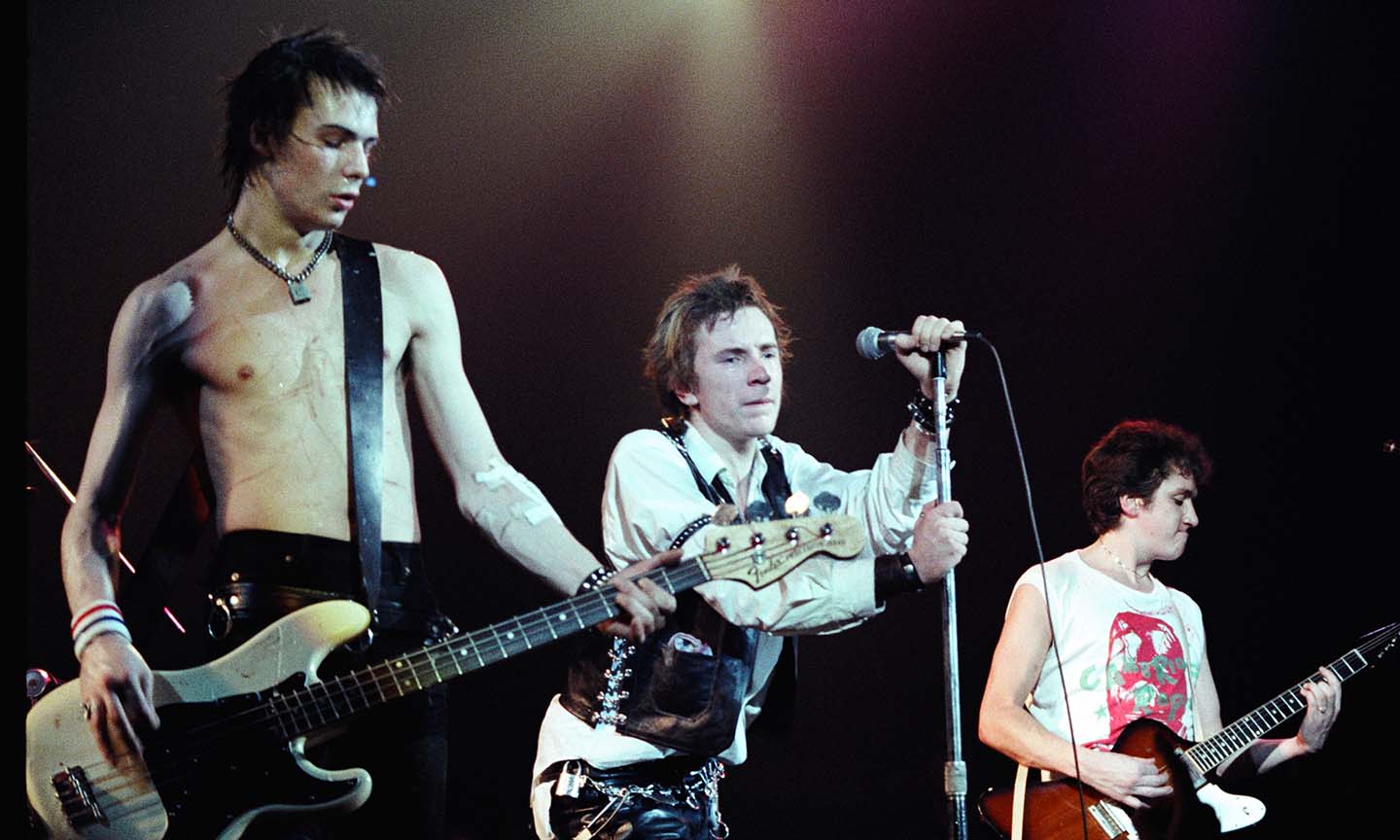The phrase “shock of the new” barely covers the impact the Sex Pistols had on British music. The Pistols’ riotous energy, establishment-baiting lyrics, and raw power made them the most notorious band in the land and the catalyst for the British punk movement. There had never been a mainstream band like them – their ragged look, their confrontational worldview, John Lydon’s sneering vocals – but beneath the filth and the fury, the Pistols’ musical roots showed through, not least in the songs they covered.
Back in August 1975, Pistols manager Malcolm McLaren spotted the 19-year-old Lydon wearing a Pink Floyd T-shirt that he’d modified by scrawling “I hate” above the band’s name. Lydon auditioned for the Pistols by singing along to Alice Cooper’s “I’m Eighteen,” a howl of teenage frustration, and their early setlists were covers-heavy, with chaotic, speedfreak takes on songs by 60s mod groups – The Small Faces, The Who, The Creation – and sass-filled rock’n’roll, such as “Don’t Give Me No Lip, Child” by Dave Berry and “I’m Not Your Stepping Stone” by Paul Revere & The Raiders. Covers remained important to the Pistols right up to their split, following their only US tour in January 1978, documented by the new set Live In The USA 1978. Here are five of the best cover versions by the Sex Pistols.
Order Sex Pistols’ Live in the USA 1978 now.
Substitute
It’s easy to see echoes of the early years of The Who, with their explosive take on British R&B and Pete Townshend’s generation-gap-defining lyrics, in the Sex Pistols. But as his band became public enemy number one in the UK, John Lydon adopted a year zero stance, distancing himself from the previous generation of British rockers. In a December 1976 Record Mirror interview, Lydon was scathing, “We have got to fight the entire super band system. Groups like The Who and the Stones are revolting… Life has become safe for them. They are just so pathetic.”
Despite Lydon’s sneers, The Who’s “Substitute” had been part of Pistols setlists since their first gig, supporting Bazooka Joe at Central Saint Martins College of Art and Design, London, on November 6. The Pistols’ take was recorded during 1976 rehearsals with producer Dave Goodman at Lansdowne Road and Wessex studios and, after overdubs, eventually released on the 1979 soundtrack to Julien Temple’s movie, The Great Rock’n’Roll Swindle.
The Who’s original was a lean and tough expression of otherness – the narrator sees himself as a mere stand-in for somebody who is richer, taller, younger and better-dressed – propelled by John Entwistle’s thundering bass and Keith Moon’s freewheeling drumming. In the Pistols’ hands, it became a revved-up, cathartic howl, Lydon spitting out the key line, “I was born with a plastic spoon in my mouth,” with utter disgust.
Townshend recognized an arty rabble rouser when he saw one and was a great admirer of the Pistols, Lydon in particular. The guitarist even told Music News in 2011 that Lydon was his choice for the lead role of Jimmy in the 1979 film adaptation of The Who’s Quadrophenia, “I knew him as he’d been using my studio in Soho, what a fucking diamond, and so smart… [He] liked to drink and so did I, and we went out and got pissed and I drove my car the wrong way around a roundabout. Anyway, I think he decided not to do it – I really wanted him. He’s very, very intense. He could have been good.”
The Modern Lovers – Roadrunner
Back in 1986, a Spin magazine celebration of Jonathan Richman’s indie pioneers The Modern Lovers found Lydon in combative mode. “I don’t listen to music. I hate all music,” the Pistols singer declared. When pressed by the interviewer, “Not one favourite song?”, Lydon conceded, “Oh, yeah. ‘Roadrunner,’ by The Modern Lovers.
In terms of personality, the wide-eyed and unaffected Richman might seem worlds apart from the snarling cynicism of the Pistols, but the Modern Lovers’ raw, DIY approach to music clearly touched a nerve across the Atlantic. The Pistols were ahead of the pack when it came to hearing the prototype punk emerging from the US thanks to a famous friend. “We were at the epicentre of the hippest place in London at that time,” original bassist Glen Matlock told The Independent in 2021. “[Malcolm McLaren, manager] was mates with Nick Kent, who went on to become the star writer of the NME, who gave us a tape from his mate with a song on it, which we loved, and we did it. We didn’t realise it was about a car, but it was ‘Roadrunner’ by Jonathan Richman – his mate was John Cale, who’d produced the album and it was a cassette of half the album about a year before it got released. Nobody is in that position to be that hip, and that’s what we were.”
According to a list compiled by Marco Pirroni (Siouxsie & The Banshees, Adam & The Ants), the 7” single of “Roadrunner” was also on the jukebox at the Pistols’ rehearsal space in 430 Kings Road, so it’s unsurprising that it became part of the band’s repertoire. The version released on The Great Rock’n’Roll Swindle – again, taken from the 1976 sessions – is part of a medley with a chaotic take on Chuck Berry’s “Johnny B Goode.” Lydon derails the Berry song by forgetting the words and expressing his hatred of it, so requests the band play “Roadrunner.”
The other Pistols oblige, but it soon transpires that Lydon’s grasp of the “Roadrunner” lyrics is just as shaky. Despite this, with Lydon adlibbing around the lyrics he does know, the band power on, resulting in a performance that is all ferocious energy and attitude, the distilled essence of punk.
(I’m Not Your) Stepping Stone
More evidence that the Pistols’ tastes were poppier than they initially let on. “(I’m Not Your) Stepping Stone” was written by US singer-songwriter duo Tommy Boyce and Bobby Hart and was first released by garage rockers Paul Revere & The Raiders, before becoming a smash hit for The Monkees – the ultimate in manufactured bubblegum pop. Again, the song was in the Pistols’ set from their earliest days (“Ten points for doing it, ten more for doing it well,” wrote Charles Shaar Murray, reviewing them for NME in September 1976) and a take recorded by Dave Goodman in 1976 was overdubbred for the version released on The Great Rock’n’Roll Swindle.
Lydon is the star of the show here, taking the growling menace of Mark Lindsay’s delivery of the Paul Revere & The Raiders version and adding an unhinged intensity all of his own. The lyrics take aim at a social climber who has wronged the narrator, who is determined to never be taken of advantage again. Lydon inhabits the role, pouring the same righteous disdain into his mic that would later power “Pretty Vacant” and “God Save The Queen.”
The Pistols’ thrillingly abrasive take on “(I’m Not Your) Stepping Stone” gave the pop classic new life. Minor Threat put a hardcore spin on the track, blasting through it on 1981’s In My Eyes EP and claiming (somewhat surprisingly considering the members would’ve come of age in the 60s) that they thought the song was a Pistols original.
The Stooges – No Fun
The Stooges’ “No Fun” could’ve been written for the Pistols. It’s a blistering evocation of the brain-numbing effects of boredom and antipathy, inspired by singer Iggy Pop’s adolescence. The Pistols made it a vital part of their setlist from their second gig, on November 7, 1975 at Holburn School Of Art, London, and it was the last song played at Winterland, San Francisco, on January 14, 1978, the Pistols’ final gig before John Lydon left the band.
In the Pistols’ early days, “No Fun” was a defiant rallying cry, best heard on the six-minute onslaught released as the B-side to 1977 single “Pretty Vacant.” Steve Jones’ guitar is as subtle as a battering ram, emulating the awesome power of The Stooges’ original, while Lydon purrs, cackles and rants like a man possessed.
In contrast, the Winterland performance – which now features on Live In The USA 1978 – is the sound of a band falling apart. The Pistols’ two-week stint in the US had been plagued by controversy – from initially being refused entry because of past criminal convictions (their US label eventually stumped up a $1 million surety) to a litany of smashed up dressing rooms, attacks on audiences and below-par performances (chiefly from bassist Sid Vicious). By the time they reach the encore of “No Fun” at Winterland, the spark and energy of those early days is faded and frustrations are on the verge of boiling over. Lydon begins the song by telling the crowd, “You’ll get one number and one number only because I’m a lazy bastard.”
From there, things steadily decline – though Jones’ guitar is ferocious to begin with, Vicious’ bass playing is erratic and drops out totally at times, sapping the song of momentum. Lydon notices this and his vocals become an indecipherable squawk. Before long, he’s asking rhetorical questions of the audience (“Oh bollocks, why should I carry on”) and repeating, “No fun… all alone” in an unsettling monotone. Somehow, drummer Paul Cook and Jones muster the energy to steer the song to a visceral ending before Lydon laughs and cheerfully utters his famous final words as a Sex Pistol, “Ever get the feeling you’ve been cheated, good night.” It’s compelling and unfiltered mayhem, utterly bullshit-free and totally punk. Iggy Pop would certainly have approved.
Frank Sinatra – My Way
In February 1977, Pistols manager Malcolm McLaren claimed that Glen Matlock had been fired for the heinous sin of liking The Beatles. In reality, McLaren wanted to replace the musically proficient Matlock with Sid Vicious, a punk scenester and Pistols superfan who couldn’t play a note but had a look and attitude certain to cause a tabloid frenzy. McLaren’s instincts proved correct and months after joining the band, Vicious’ dedication to rock’n’roll excess left him with a heroin problem and a toxic relationship with Nancy Spungen.
Despite Lydon’s departure at the end of the US tour, McLaren’s plans for a Pistols movie, The Great Rock’n’Roll Swindle, went ahead and filming began in April 1978. Vocal duties were shared throughout the cast but – inevitability, considering his increasing fame – Vicious became the group’s focal point. He took lead vocals on versions of the Eddie Cochran songs “Something Else” and “C’mon Everybody”, along with the performance for which he’d be most remembered, his take on “My Way,” the standard to end all standards, made famous by Frank Sinatra.
“We spent two weeks in Paris trying to get Sid to do the song and do the film,” recalled Julien Temple, director of The Great Rock’n’Roll Swindle, in Sex Pistols: The Inside Story by Fred and Judy Vermorel. “What we had to do to make him do ‘My Way’ was change the words for him which Nancy helped to do a lot. And once he could understand that ‘My Way’ was going to be changed for him, he was fine with it. ’Cos the original idea, which wouldn’t have been so good, was to have him sing it like Sinatra all the way through. And Sid was saying: ‘I want to do it like the Ramones’. And the compromise was one verse, the opening part, in a traditional way and then we did it in a Ramones way.”
Vicious’ take might have been heresy to devotees of Ol’ Blue Eyes, but it captured the essence of the wild and troubled young punk. It begins with a warped-sounding backing track (from Penguin Café Orchestra’s Simon Jefffes) before Vicious performs the first verse in a mocking impression of an upper-class lounge singer. His irreverence firmly established, the arrangement shifts into chugging, punked-up guitars and Vicious shouts and snarls the remainder of the song with Lydon-like glee. Despite the bum notes and wayward approach to melody, Vicious made the song his own – surely the point of “My Way.” His version won the approval of Paul Anka, who wrote the English version of the song (it was based on “Comme d’habitude” by Jacques Revaux, Gilles Thibaut, and Claude François). Anka later wrote, “I loved it; I was really flattered and amused by his version… I was flattered that a punk like Sid wanted to do ‘My Way,’ someone who was into music totally different from mine.”
Tragically, “My Way” became an epitaph for Vicious, who died in February of a heroin overdose aged 21. Since Vicious’ death, his take on the classic has taken on a life of its own, most famously playing over the end credits of Martin Scorsese’s 1990 film Goodfellas.




